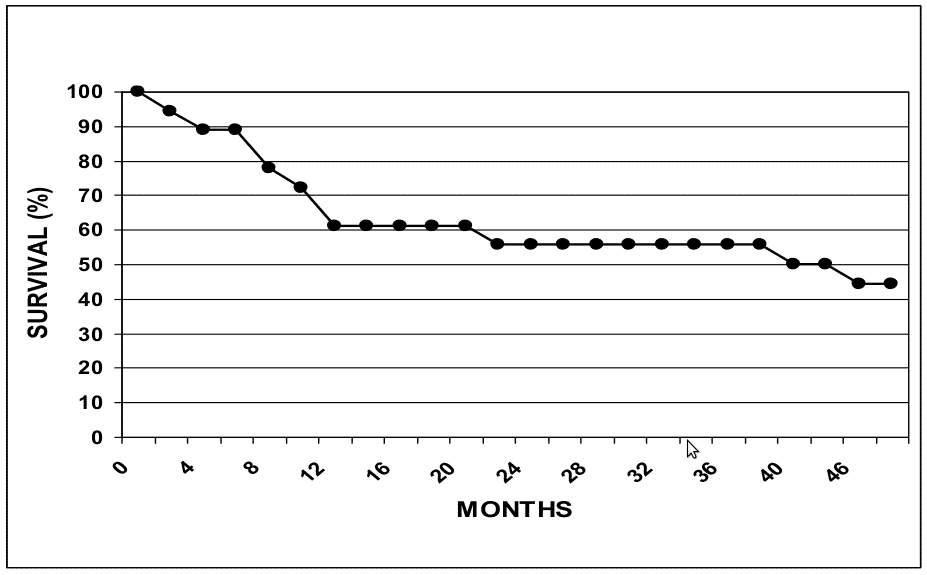Renal cancer has a high metastatic potential, with about 30% patients having distant metastases at the time of diagnosis. Metastatic lesions tend to develop in more than 20% patients following nephrectomy. The renal cancer is typically resistant to chemoradiotherapy, which makes immunotherapy the leading modality in the systemic treatment of this disease.
Available data (Davydov et al. 2006 ) suggests that median survival rate in patients with disseminated renal cancer ranges between 6 and 12 months, and 2-year survival rate is about 10%. Figure 1 demonstrates survival data for 18 vaccine-treated patients (12 male, 6 female; age 54-76) with IV stage renal cancer.

Figure 1. Survival rate in the vaccine-treated renal cancer patients (n=18)
The results obtained show that about 50% vaccine-treated patients survived for longer than 4 years, which makes presented data very encouraging.
Examples.
Case 1. A 64-old female patient I was diagnosed with clear cell cancer (renal adenocarcinoma) of the right kidney (T4NxMx) upon surgical inspection of the abdominal cavity. The patient had strong abdominal pain on the right side, elevated ESR (40 mm/h) and normal excretory kidney function. Computer tomography (CT) revealed a tumor lump (76 х 60 х 100 mm) of the right kidney intimately adjacent to the liver. Vaccine therapy was initiated and well tolerated. Immediately after vaccination we noted the development of tissue induration of 30- 40 mm in diameter at the injection site. Three months after the vaccine therapy onset ERS values returned to the base level (11 mm/h), and no sighs tumor growth were observed by ultrasonography. Final follow-up 2.5 years after vaccine therapy onset showed no evidence of disease progression.
Case 2. A 61-old female patient II was initially subjected to surgery due to developing cysts in the left kidney followed by nephrectomy one month later. Metastases of renal cell carcinoma were detected in the right ovary followed by total hysterectomy and subsequent course of interferon immunotherapy. Several months later, multifocal tumor lesions of the right kidney and adrenal gland were revealed by CT. The patient was subjected to vaccine therapy. Final follow-up 3 years after vaccine therapy onset showed stabile health status of the patient and no evidence of disease progression.
Related scientific publications:
- Current and Future Applications of Novel Immunotherapies in Urological Oncology: A Critical Review of the Literature.
Özdemir BC, Siefker-Radtke AO, Campbell MT, Subudhi SK. Eur Urol Focus. 2017 Oct 19. pii: S2405-4569(17)30238-9. doi: 10.1016/j.euf.2017.10.001. [Epub ahead of print] Review.
https://www.ncbi.nlm.nih.gov/pubmed/29056275 - Results of a Phase 1/2 Study in Metastatic Renal Cell Carcinoma Patients Treated with a Patient-specific Adjuvant Multi-peptide Vaccine after Resection of Metastases.
Rausch S, Gouttefangeas C, Hennenlotter J, Laske K, Walter K, Feyerabend S, Chandran PA, Kruck S, Singh-Jasuja H, Frick A, Kröger N, Stevanović S, Stenzl A, Rammensee HG, Bedke J. Eur Urol Focus. 2017 Oct 4. pii: S2405-4569(17)30213-4. doi: 10.1016/j.euf.2017.09.009. [Epub ahead of print]
https://www.ncbi.nlm.nih.gov/pubmed/28988765 - Advances on immunotherapy in genitourinary and renal cell carcinoma.
Botta GP, Granowicz E, Costantini C. Transl Cancer Res. 2017 Feb;6(1):17-29. doi: 10.21037/tcr.2017.02.09.
https://www.ncbi.nlm.nih.gov/pubmed/28966917 - Novel immunotherapy in metastatic renal cell carcinoma.
Cho YH, Kim MS, Chung HS, Hwang EC. Investig Clin Urol. 2017 Jul;58(4):220-227. doi: 10.4111/icu.2017.58.4.220. Epub 2017 Jun 20. Review.
https://www.ncbi.nlm.nih.gov/pubmed/28681030 - Intratumorally injected pro-inflammatory allogeneic dendritic cells as immune enhancers: a first-in-human study in unfavourable risk patients with metastatic renal cell carcinoma.
Laurell A, Lönnemark M, Brekkan E, Magnusson A, Tolf A, Wallgren AC, Andersson B, Adamson L, Kiessling R, Karlsson-Parra A. J Immunother Cancer. 2017 Jun 20;5:52. doi: 10.1186/s40425-017-0255-0. eCollection 2017.
https://www.ncbi.nlm.nih.gov/pubmed/28642820
